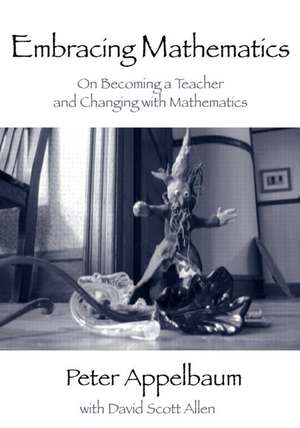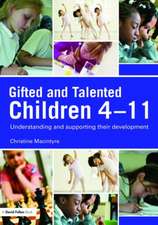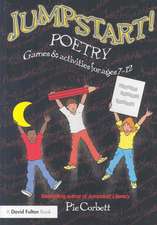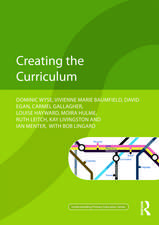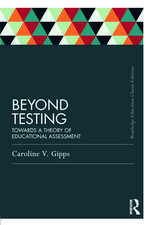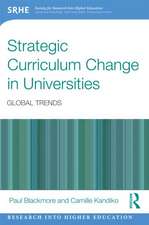Embracing Mathematics: On Becoming a Teacher and Changing with Mathematics
Autor Peter Appelbaum, with David Scott Allenen Limba Engleză Paperback – 13 mai 2008
Embracing Mathematics:
- integrates pedagogy and content exploration in ways that are unique in mathematics education
- features textboxes with reflection questions and suggested explorations that can be easily utilized as homework for a course or as discussion opportunities for teacher reading groups
- offers examples of teachers’ action research projects that grew out of their interactions with the main chapters in the book
- is not narrowly limited to mathematics education but incorporates curriculum studies – an invaluable asset that allows instructors to find more ways to engage students in self-reflexive acts of teaching
| Toate formatele și edițiile | Preț | Express |
|---|---|---|
| Paperback (1) | 362.93 lei 6-8 săpt. | |
| Taylor & Francis – 13 mai 2008 | 362.93 lei 6-8 săpt. | |
| Hardback (1) | 993.87 lei 6-8 săpt. | |
| Taylor & Francis – 13 mai 2008 | 993.87 lei 6-8 săpt. |
Preț: 362.93 lei
Preț vechi: 521.05 lei
-30% Nou
Puncte Express: 544
Preț estimativ în valută:
69.46€ • 72.25$ • 58.21£
69.46€ • 72.25$ • 58.21£
Carte tipărită la comandă
Livrare economică 13-27 martie
Preluare comenzi: 021 569.72.76
Specificații
ISBN-13: 9780415963855
ISBN-10: 0415963850
Pagini: 368
Ilustrații: 8 tables and Adapt Grant template and provide editoral with sample of design before setting whole book
Dimensiuni: 178 x 254 x 20 mm
Greutate: 0.68 kg
Ediția:1
Editura: Taylor & Francis
Colecția Routledge
Locul publicării:Oxford, United Kingdom
ISBN-10: 0415963850
Pagini: 368
Ilustrații: 8 tables and Adapt Grant template and provide editoral with sample of design before setting whole book
Dimensiuni: 178 x 254 x 20 mm
Greutate: 0.68 kg
Ediția:1
Editura: Taylor & Francis
Colecția Routledge
Locul publicării:Oxford, United Kingdom
Cuprins
Preface: How can I (better) embrace mathematics? David Scott Allen
Prologue Peter Appelbaum
Response to Prologue: Be a student of mathematics learners
Chapter 1: Planning and assessment
Response to Chapter 1: Engage yourself in meaningful observation
Action Research 1 Isaiah Manzella, Numbers on Trial
MathWorlds 1: Reverse answer to questions
Chapter 2: A psychoanalytic perspective
Response to Chapter 2: Ask yourself to change
Action Research 2 Karen Cipriano, Flexible interview project
MathWorlds 2: Multiple answers.
Chapter 3: You are a mathematician
Response to Chapter 3: Explore the vastness of mathematics
Action Research 3 Karen Cipriano, Mathematics journals
MathWorlds 3: Reading and writing mathematics
Chapter 4: Critical thinkers thinking critically
Response to Chapter 4: It is critical to think
Action Research 4 Ada Rocchi, Lesson: world population and wealth
MathWorlds 4: Pitching questions at various levels.
Chapter 5: Consuming culture: commodities and cultural resources
Response to Chapter 5: Emphasize the meaning-making of mathematics
Action Research 5 Colleen Murphy, Problem solving through literature
MathWorlds 5: Turning "puzzles" into "problems" or "exercises"
Chapter 6: Metaphors for the classroom space
Response to Chapter 6: Take ownership of your classroom space
Action Research 6 Kristin Iaccio, Linking mathematics to social issues
MathWorlds 6: Same math, different metaphors
Chapter 7: Places where people learn mathematics
Response to Chapter 7: The classroom is always changing
Action Research 7 Petal Sumner, Empowering students who don’t learn
Chapter 8: When students don’t learn
Response to Chapter 8: We are all students
Epilogue: Becoming a teacher and changing with mathematics
Afterword: What will you write in your chapter?
Appendices
Prologue Peter Appelbaum
Response to Prologue: Be a student of mathematics learners
Chapter 1: Planning and assessment
Response to Chapter 1: Engage yourself in meaningful observation
Action Research 1 Isaiah Manzella, Numbers on Trial
MathWorlds 1: Reverse answer to questions
Chapter 2: A psychoanalytic perspective
Response to Chapter 2: Ask yourself to change
Action Research 2 Karen Cipriano, Flexible interview project
MathWorlds 2: Multiple answers.
Chapter 3: You are a mathematician
Response to Chapter 3: Explore the vastness of mathematics
Action Research 3 Karen Cipriano, Mathematics journals
MathWorlds 3: Reading and writing mathematics
Chapter 4: Critical thinkers thinking critically
Response to Chapter 4: It is critical to think
Action Research 4 Ada Rocchi, Lesson: world population and wealth
MathWorlds 4: Pitching questions at various levels.
Chapter 5: Consuming culture: commodities and cultural resources
Response to Chapter 5: Emphasize the meaning-making of mathematics
Action Research 5 Colleen Murphy, Problem solving through literature
MathWorlds 5: Turning "puzzles" into "problems" or "exercises"
Chapter 6: Metaphors for the classroom space
Response to Chapter 6: Take ownership of your classroom space
Action Research 6 Kristin Iaccio, Linking mathematics to social issues
MathWorlds 6: Same math, different metaphors
Chapter 7: Places where people learn mathematics
Response to Chapter 7: The classroom is always changing
Action Research 7 Petal Sumner, Empowering students who don’t learn
Chapter 8: When students don’t learn
Response to Chapter 8: We are all students
Epilogue: Becoming a teacher and changing with mathematics
Afterword: What will you write in your chapter?
Appendices
Notă biografică
Peter Appelbaum is Associate Professor, Arcadia University, Pennyslvania, where he teaches Mathematics Education, Curriculum Theory, and Cultural Studies, and is Coordinator of Mathematics Education Programs, and serves on the University Undergraduate Academic Programs Committee; University General Education Task Force; University Intercultural Committee. Secondary Education Committee; and Elementary Education Committee. His publications include Popular Culture, Educational Discourse, and Mathematics (SUNY Press, 1995); (Post) Modern Science (Education): Frustrations, propositions, and alternative paths, coedited with John Weaver and Marla Morri (Peter Lang, 2001), Multicultural and Diversity Education (ABC-CLIO, 2002), Children’s Books for Grownup Teachers (LEA/Routledge, in press), and numerous chapters in edited volumes and journal articles.
David Scott Allen teaches 7th, 8th, and sometimes 9th grade math at Pennbrook Middle School in North Wales, Pennsylvania.
David Scott Allen teaches 7th, 8th, and sometimes 9th grade math at Pennbrook Middle School in North Wales, Pennsylvania.
Recenzii
"This book is likely to have a substantial impact on the landscape of pedagogical thinking. The pedagogy is a model for how to be engaged in life, in this sense presenting a personal vision that informs more than how to teach."
David Kirshner, Louisiana State University
"Embracing Mathematics offers mathematics teachers other possibilities for teaching, in practical and very tangible ways. Simultaneously, [it] challenges the current field and provides possibilities for how these ‘different’ ways of considering teaching can work effectively in our current situations."
Sarah Smitherman Pratt, University of North Carolina at Greensboro
"Embracing Mathematics...[offers] a theoretical and practical grounding for how teachers might enhance all students’ access to powerful mathematical ideas—irrespective of socioeconomic background, home language, and out-of-school affiliations."--Margaret Anne Walshaw, Educational Studies in Mathematics (2010) 73:99-103
"This book is likely to have a substantial impact on the landscape of pedagogical thinking. The pedagogy is a model for how to be engaged in life, in this sense presenting a personal vision that informs more than how to teach."--David Kirshner, Louisiana State University
"Embracing Mathematics offers mathematics teachers other possibilities for teaching, in practical and very tangible ways. Simultaneously, [it] challenges the current field and provides possibilities for how these ‘different’ ways of considering teaching can work effectively in our current situations."--Sarah Smitherman Pratt, University of North Carolina at Greensboro
"Embracing Mathematics presents a wealth of educational ideas. It provides lenses for seeing classroom practice as open to fascinating changes. Emerging as a powerful collective achievement, it provides a dialogical opening of post-modern trends in critical mathematics education, seen as practice, as research, and as learning for everybody." Ole Skovsmose, Aalborg University, Denmark
"This is a book that helps the reader think about his/her practice. It guides teachers in a quest for teaching methods that will enable students to develop a critical mind, which should be the goal of all mathematics education. But it is also an extraordinarily practical book that along with stimulating ideas provides numerous applications, which are immediately useful in the mathematics classroom."--Corinne Hahn, Advancia-Negocia and European School of Management; President, International Commission for Study and Improvement of Mathematics Teaching
David Kirshner, Louisiana State University
"Embracing Mathematics offers mathematics teachers other possibilities for teaching, in practical and very tangible ways. Simultaneously, [it] challenges the current field and provides possibilities for how these ‘different’ ways of considering teaching can work effectively in our current situations."
Sarah Smitherman Pratt, University of North Carolina at Greensboro
"Embracing Mathematics...[offers] a theoretical and practical grounding for how teachers might enhance all students’ access to powerful mathematical ideas—irrespective of socioeconomic background, home language, and out-of-school affiliations."--Margaret Anne Walshaw, Educational Studies in Mathematics (2010) 73:99-103
"This book is likely to have a substantial impact on the landscape of pedagogical thinking. The pedagogy is a model for how to be engaged in life, in this sense presenting a personal vision that informs more than how to teach."--David Kirshner, Louisiana State University
"Embracing Mathematics offers mathematics teachers other possibilities for teaching, in practical and very tangible ways. Simultaneously, [it] challenges the current field and provides possibilities for how these ‘different’ ways of considering teaching can work effectively in our current situations."--Sarah Smitherman Pratt, University of North Carolina at Greensboro
"Embracing Mathematics presents a wealth of educational ideas. It provides lenses for seeing classroom practice as open to fascinating changes. Emerging as a powerful collective achievement, it provides a dialogical opening of post-modern trends in critical mathematics education, seen as practice, as research, and as learning for everybody." Ole Skovsmose, Aalborg University, Denmark
"This is a book that helps the reader think about his/her practice. It guides teachers in a quest for teaching methods that will enable students to develop a critical mind, which should be the goal of all mathematics education. But it is also an extraordinarily practical book that along with stimulating ideas provides numerous applications, which are immediately useful in the mathematics classroom."--Corinne Hahn, Advancia-Negocia and European School of Management; President, International Commission for Study and Improvement of Mathematics Teaching
Descriere
This "alternative textbook" integrates pedagogy and content exploration in ways that are unique in mathematics education, provoking new ideas for making mathematics education meaningful to teachers at all levels as well as their students.
